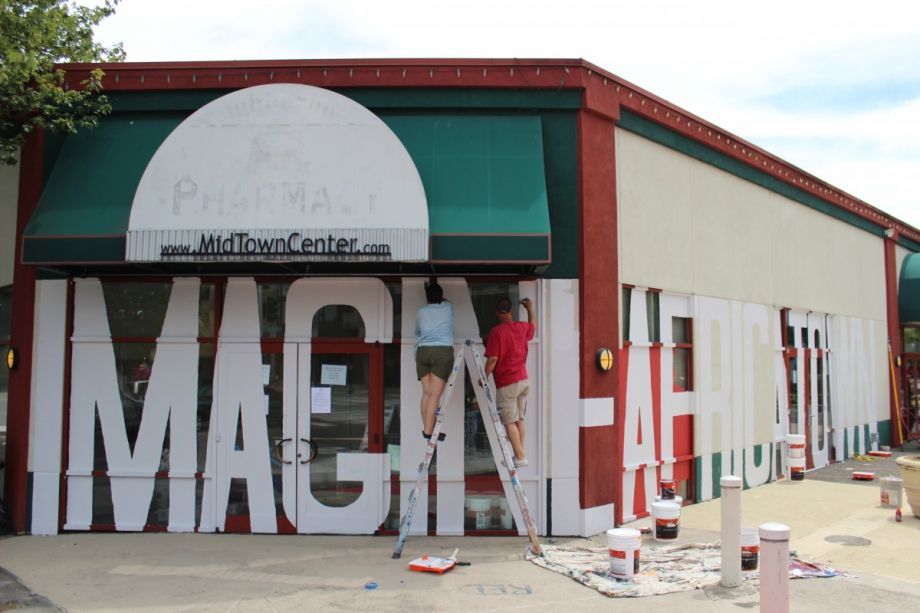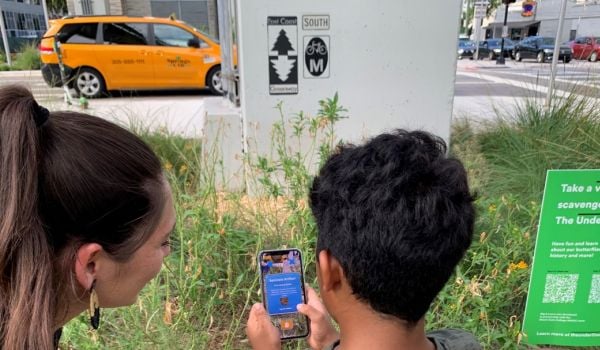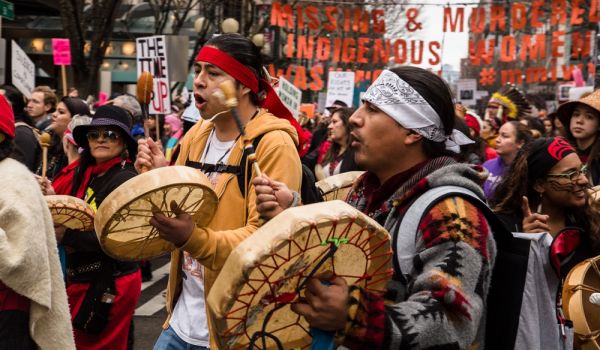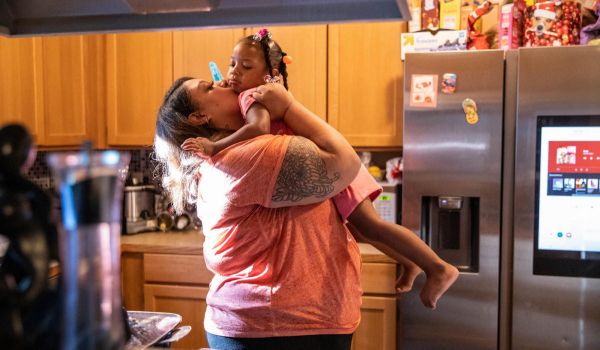Destiny Harris was one of over 200 volunteers who turned out on Sunday, July 8, to paint the walls and parking lot of the Midtown Center strip mall, a large parcel being redeveloped in Seattle’s historically-black Central District.
“I see my neighborhood getting torn down every day so I decided to help my community around me,” said Harris, who attended elementary through high school in the Central District. “It does feel more empowering to show people that we can build our community back the way it was.”
Once one of the only areas in the city where black families were permitted to buy homes or rent apartments, the Central District has faced a ton of change over the past few decades. The area’s black population dropped from a peak of over 70 percent in the 1970s to less than 20 percent today. The remaining black community itself has also changed, with Ethiopian restaurants just as likely examples of black-owned businesses as soul food spots.
At the Midtown Center parking lot, volunteers painted a kente cloth motif, referencing African diasporic roots extending from formerly enslaved persons to newer neighborhood arrivals from Ethiopia and other East African countries. Local artists painted “IMAGINE AFRICATOWN” on the walls facing the kente cloth parking lot. A collage of photos submitted by nearby residents covers the top of a “community coffee table” on the lot. On Saturday, Seattle Mayor Jenny Durkan cut the ribbon on the mural and street furniture installation, formally christened the “Imagine Africatown Pop-Up Plaza.”
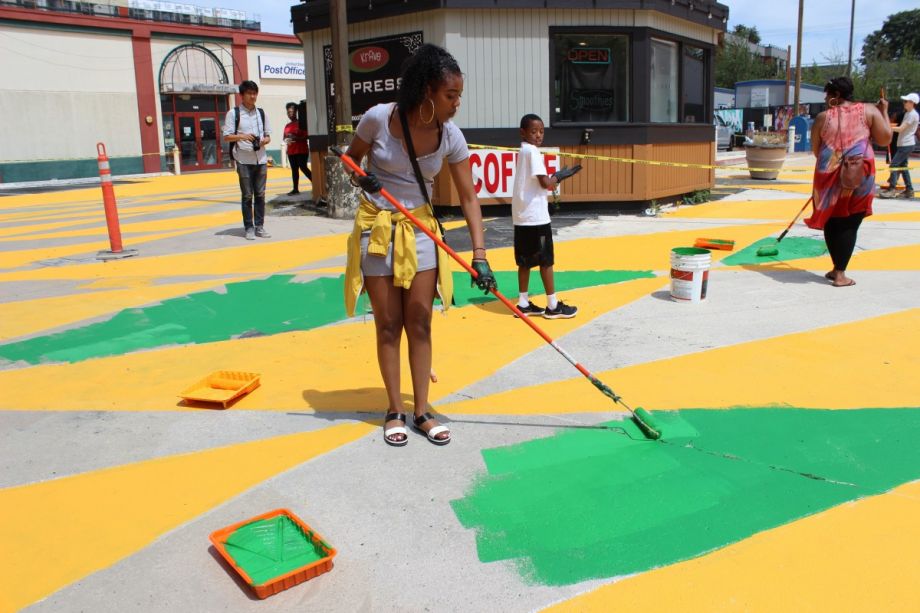
Destiny Harris, who did her primary and secondary schooling in Seattle's historically-black Central District, adds a splash of green to the block-sized paint job at Midtown Center. (Photo by Gregory Scruggs)
The Central District’s black residents will be making their historic legacy and remaining presence known in a more permanent fashion, thanks to new design guidelines and community-led efforts to develop properties in the neighborhood, including the Midtown Center strip mall.
Africatown, a community land trust that owns 20 percent of the Midtown Center property, received a $1 million grant last month from the Seattle Office of Planning and Community Development. The grant promises to advance the land trust’s efforts to develop affordable rental, homeownership, and business opportunities in the Central District. Community land trusts are specialized nonprofits that take ownership of land usually for the purpose of renting or making housing or commercial and cultural space available for ownership at permanently affordable prices.
The intersection where Midtown Center sits, at 23rd and Union, once found itself at the center of the city’s gentrification debates after a flashy legal pot store opened on the same corner where police once harassed young black men who sold cannabis pre-legalization. The episode earned the area the label of “the most controversial block in Seattle.” (The store, it turns out, is owned by a Jewish businessman with his own roots in the Central District, which was a Jewish neighborhood before it was a black neighborhood.)
Founded by K. Wyking Garrett, a third-generation Central District resident, Africatown wants to reclaim the history of a neighborhood jazz scene that nurtured both Ray Charles and Quincy Jones, while also incorporating the thousands of immigrants from East African countries who have settled in the Seattle area in recent decades.
The stake in Midtown Center is the second property in the Africatown’s portfolio, which also includes a partial ownership stake in an affordable housing development a block away, on the former site of the first black-owned bank west of the Mississippi.
Future developments in the Central District, by Africatown or others, will all be subject to new city-approved design guidelines that call for Afrocentric design standards for projects in the neighborhood.
“Africatown is pioneering this [approach],” says urban planner Nmadili Okwumabua. “The architecture will preserve their presence, the culture, the history, the story.”
Based in Atlanta, Okwumabua came to Seattle in July to give a lecture as part of a weekend effort to solicit design ideas for Midtown Center from local residents. Attendees talked about Afro-diasporic food, music, and festivals as amenities they hope for in the new development. Okwumabua made the case that brick and mortar is just as important as the arts and food.
“Architecturally it’s important that Africatown include [African influence] in their buildings — not just the festivals, the food, the music — the buildings as well,” says Okwumabua. “A thousand years from now archaeologists will ask who were these people and why did they do this?”
Meanwhile, Africatown’s resident engagement has already yielded design changes for Midtown Center from the for-profit developer who controls the other 80 percent of the property, including paving patterns and an art wall inspired by the recent mural installation; a proposed media wall on the public-facing corner with content covering neighborhood history; and increased public space that will give neighborhood residents a place to congregate like they customarily have at that corner of the property. (The for-profit side will also include over 400 units of affordable housing.)
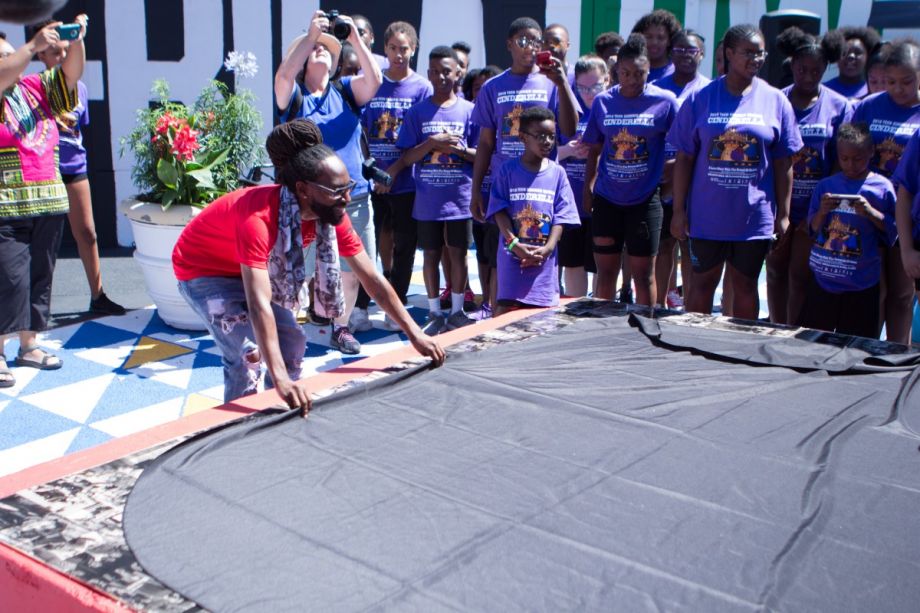
Revealing a collage of photos submitted by local residents. (Photo by Mujale Chisebuka)
There remains some neighborhood concern that this 80 percent of the Midtown Center property not owned by Africatown, which is further along in the development process, won’t have commercial tenants that reflect the needs of the remaining black community. At a recent design review meeting, Lake Union Partners, the developer of the 80 percent, publicly committed to offering below-market rents to recruit black-owned businesses in the smaller retail spaces while charging a chain drugstore at or above market rate on the corner to subsidize the lower rents. But no leases have been signed, yet. The block is slated for demolition by the end of the year.
Although Africatown lags behind the faster pace of the for-profit developer, the non-profit group continues to build momentum. Perched alongside the city’s now ubiquitous blue-and-white land use signs heralding a new development, a new sign catches the eye with architectural renderings inspired by the fictional cityscape of Wakanda, from the comic-book-turned-blockbuster-film, “Black Panther.” Its message reads: “Coming Soon.”

Gregory Scruggs is a Seattle-based independent journalist who writes about solutions for cities. He has covered major international forums on urbanization, climate change, and sustainable development where he has interviewed dozens of mayors and high-ranking officials in order to tell powerful stories about humanity’s urban future. He has reported at street level from more than two dozen countries on solutions to hot-button issues facing cities, from housing to transportation to civic engagement to social equity. In 2017, he won a United Nations Correspondents Association award for his coverage of global urbanization and the UN’s Habitat III summit on the future of cities. He is a member of the American Institute of Certified Planners.

